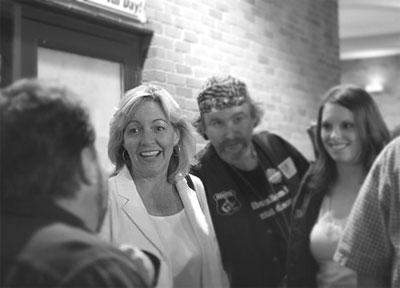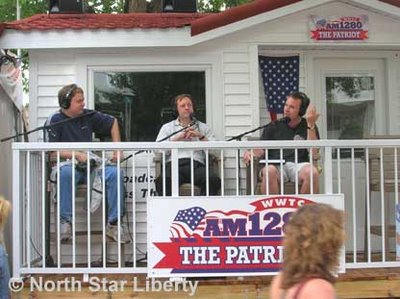Debate Minnesota began operating in 2004. It is funded by the nonpartisan, nonprofit 501(c)(3) organization, Debate Minnesota Foundation. In the current election cycle, fifteen Debate Minnesota debates are scheduled in the races for U.S. Senate, Governor, three Congressional Districts, and ten state legislative races. In the spirit of the Lincoln-Douglas debates, Debate Minnesota strives to "promote civility" in the political process, and "provide a platform for a fair, informative, and in-depth exchange of ideas."
After the candidates' opening statements, seemingly plucked from their campaign lit, moderator Steve Berg, editorial writer at the Star Tribune, presented the policy questions in two areas: transportation and education. Each area was allotted ten minutes total, for the question and responses from both candidates plus follow-ups. The candidates had to get to the point quickly with a timekeeper, Toastmasters-style, holding up cards to show the remaining time. That left about an hour for the questions from the audience and candidate closing statements.
Transportation
Berg started off by observing how terrible the roads are in Minnesota compared to places like North Carolina, Phoenix, and Denver. He quoted MnDOT as saying that Minnesota is years behind in the building of our transportation infrastructure. Then he asked the candidates how they would address Minnesota's transportation issues.
Johnson used her three-minute response to endorse the constitutional amendment that would dedicate 100% of the MVST to transportation, to be split "at least 40 percent for public transit assistance and not more than 60 percent for highway purposes." Johnson hopes that if passed by the voters, the "at least-not more than" language will be clarified in statute.
Bonoff also endorsed the MVST amendment, and claimed credit for the idea to also dedicate the motor vehicle lease tax to transportation in the same proportion as the MVST (HF 3127, Abrams). She also promoted the need for heavy investments in "multimodal" transportation solutions like other cities in the country have.
Berg asked the candidates whether the Governor should have vetoed the gas tax increase last session.
Bonoff said no, and blamed the veto on his No New Taxes pledge to the Taxpayers League of Minnesota. But then she said that she is "not solidly" in favor of a gas tax increase today.
Johnson suggested that bonding for road construction would make sense if the MVST amendment passes. She pointed out that delaying the start of construction projects inevitably leads to increased costs. She would "consider" a gas tax increase because it would be a user fee for transportation and ease the pressure on local governments' transportation expenditures.
Education
Berg gave a weak, open-ended intro to the topic of education, basically saying that you can't get a decent job out of high school anymore, then asking the candidates to take it from there. I don't think that Lincoln or Douglas, or any high school debate coach, would have been impressed with Berg's prep for this important topic. All he would have had to do was read from Debate Minnesota's own thorough education issue backgrounder and sample questions!
Johnson will be looking at an upcoming state report on funding an "adequate education" as a guide for future K-12 funding discussions. She believes that schools should be able to count on a stable source of funding. She also believes in local control, saying that from her conversations with school board members, it sounds like it's easier to be mayor than a school board member due to the mandates imposed on school districts from state and local governments. She also said that if school districts want to raise additional taxes to provide an education "beyond adequate," then they should have the power to go to voters for excess levy referenda, without artificial caps on the levy amount.
Bonoff said that school districts have a big "problem" of diversity, meaning students from many diverse backgrounds with diverse needs. She suggested a repeat of the "Minnesota Miracle" to reinvest in education.
Berg asked whether the candidates favor Governor Pawlenty's proposal to spend at least 70% of K-12 funding in the classroom.
Bonoff used words like "ridiculous" and "nonsense" in her response, saying that Pawlenty's proposal makes her mad. The average is already 69% statewide, she said. Bonoff spoke about various education legislation that she sponsored last session.
Johnson does not support the 70% plan, either. She said that "mandates cost you more, and get you less." She reiterated her support for local control of the schools. As a further example of local control, she cited the local WALT tests used in the Wayzata School District, which track individual student performance year-to-year, as opposed to the Minnesota Comprehensive Assessments, the state mandated tests, which aggregate student performance data.
Local issue: eminent domain
Bethany Wesley, managing editor of the Plymouth Sun-Sailor newspaper, asked the local issue question: was eminent domain reform, passed in the last legislative session, necessary? And will the new law go too far, perhaps preventing the renewal of urban blight?
Bonoff said that eminent domain reform was necessary, a good law was passed. She said that it could stop urban renewal if only one property owner refuses to sell, but that it would not necessarily be a bad thing, since the old law may have favored governments too much; time will tell.
Johnson, favors protecting private property rights, and agreed that eminent domain reform was necessary. She does not believe that the new law will prevent needed urban renewal.
Questions from the audience
While orderly and civil, the program to this point found little disagreement between the candidates, and revealed little new information to the audience. The written questions from the audience, however, spiced it up a bit.
- Do you favor the teaching of Intelligent Design theory in the schools? (Funny, I didn't notice Eva Young in the audience.) Bonoff said no, it's a separation of church and state issue, and the issue "will be coming to the legislature." Johnson also said no, but that she does not favor mandated curriculum in the schools, either.
- Minnesota Defense Of Marriage Amendment (DOMA) — Johnson said that only one person has mentioned it in her door knocking. She has mixed feelings about the amendment, current law already defines marriage as between a man and a woman, yet we must have respect and equal rights for all. Bonoff said that the amendment is a "terrible thing," that it "writes hate into the constitution." She told the story of entering the Senate chamber through a gauntlet of protesters holding signs saying "NO GAY MARRIAGE." She told another story of participating in a forum with Sen. Michele Bachmann (R-Stillwater), in a church with over 2000 people in attendance. She said that the audience applauded a speaker who called for no gay marriage, and chanted "NO GAY MARRIAGE." It was unreal, said Bonoff incredulously. Some in the audience applauded loudly after Bonoff's statements opposing DOMA. Berg asked the audience, almost apologetically, to save their applause until the end. Some of those who applauded laughed. I missed the joke.
- College tuition — both candidates agreed that college tuition should be made more affordable. Both candidates seemed to favor Gov. Pawlenty's plan to offer free tuition based on academic merit. Neither candidate spoke about any onus on colleges and universities to help hold the line on tuition by holding the line on expenses.
- Kindergarten readiness — both candidates recognized the need for kindergarten readiness. Johnson mentioned public-private partnerships as a way for the private sector to participate with schools. Bonoff highlighted her effort to restore funding for the kindergarten readiness assessment. Everybody apparently accepts as gospel the distortion that 50% of Minnesota children are "not ready for kindergarten" when they enter kindergarten. I don't, and neither did the Department of Education when they released the study under then-Commissioner Cheri Pierson Yecke.
- Should the state of Minnesota increase the minimum wage? Bonoff said yes, unequivocally. Johnson said maybe, but then asked, what should the minimum wage be? And what affect would this mandate have on business (and retail prices, Judy! Where's King Banaian when you need him down here in the Cities)? She said that "wages should reflect the work being done."
- Do you support the requirement under the No Child Left Behind Act that requires schools to provide student contact information to military recruiters? Johnson said she was not familiar with the provision, but is concerned that student data be used for legitimate purposes. Bonoff is strongly opposed to the requirement, going so far as to place her son on the government's little-known "do not call" web site. She called this data sharing between the schools and the military "wrong." I'm guessing here, but I'd bet that most of those who oppose recruiting an all-volunteer military also oppose compulsory military service (as in Israel), or any other efforts to provide for the common defense, one of the basic functions of any government.
- Should voters decide whether to fund sports stadiums in the future? This hypothetical was about as hot as it got for Bonoff, which is to say, not very. My submitted question (not used) was, "Did the taxpayers of Minnesota get a good deal for the Twins stadium? Why or why not?" Bonoff said it would depend on the bill, then quickly defended her vote to exempt Hennepin County from the state law that requires all local governments to hold a referendum before levying a local option sales tax. "You knew where I stood on this issue during the last campaign." Johnson called herself "pro-referendum," saying that people who answer the door when she knocks do not like how the new Hennepin County tax was levied without a referendum. "Cities have to hold a referendum to build a library, a waste water treatment plant, or a fire station, but not a professional sports stadium," said Johnson, with irony.
- What would you do to make education an attractive career option? Both candidates recognized the need to pay teachers more. Johnson favors alternative pay incentives such as Q-Comp.
- What are you doing in your life to reduce fossil fuel use, and what measures would you support in the Legislature? Bonoff said that after watching Al Gore's movie, An Inconvenient Truth (which she recommended), she encouraged her son to buy a hybrid automobile to replace his old car. Johnson rattled off so many environmentally-friendly initiatives passed while she was mayor, I lost track (they're all listed at www.voteforjudy.com, said Johnson helpfully). She also said proudly that she and her husband installed geothermal heating at their lake cabin.
- Negative tone of campaigns — responding to a softball, both candidates agreed that "kinder, gentler campaigns begin with me (I'm paraphrasing)." Bonoff listed so many friends in the Senate Republican Caucus that she sounds like a shoo-in for either honorary member or Ms. Congeniality.
- Are you pro-choice? I guess this one was submitted by someone who was, well, pro-choice. Bonoff said yes, and shared her wake-up-and-smell-the-coffee moment, when she realized as a freshman Senator that you can try to "unite the middle," but when the MCCL suddenly attaches an amendment to a health and human services bill, you'd better be ready to vote yea or nay. So Bonoff wants her constituents to know that she would oppose any rollback of abortion law to circa forty years ago. Johnson said that she is pro-life, but considers herself a moderate when it comes to policy, but "leaning to the right" on the issue.
In her closing statement, Bonoff cited her long list of endorsements, and reminded us, "You know where I stand." Johnson cited her record of common sense, bringing people together, listening to all points of view, and doing what's right for her constituents and community. She said that she has always been about public service, not politics.
On the way out to the parking lot, I saw Sen. Larry Pogemiller (DFL-Minneapolis) seated at a table with six or eight others, in a cafeteria area next to the Black Box Theater. Johnson good-naturedly razzed him and greeted him with a handshake.
MINNESOTA POLITICS | POLITICS | MNPOLITICS | MN06







